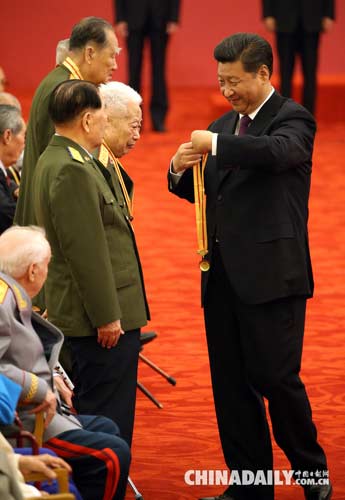Remember days past to build a better future
(China Daily) Updated: 2015-09-03 08:06
 |
|
President Xi Jinping awards medals to Chinese and foreign veterans and civilians who fought for China in the Chinese People's War of Resistance against Japanese Aggression at the Great Hall of the People in Beijing, Sept 2, 2015. [Photo by Wu Zhiyi/China Daily] |
President Xi Jinping has presented commemorative medals to 30 Chinese and foreign veterans and civilians who fought in the Chinese People's War of Resistance Against Japanese Aggression (1937-45). The medal presentation held in Beijing on Wednesday, a day before China will celebrate Victory Day, shows the country will never forget the sacrifices our forefathers made to fight Japanese aggressors before and during World War II.
To commemorate the 70th anniversary of the end of WWII and the War of Resistance Against Japanese Aggression, China will hold a series of events, including a grand military parade, which many leaders and representatives from countries around the world will attend.
The main aim of the commemorative activities is to remind people of the hard-won victory and the importance of avoiding another war. The activities will refresh our memory about the perseverance of the Chinese people who fought the Japanese to save the world from fascism and restore peace. They were heroes for bravely fighting fascism and pioneers for upholding peace.
It is these heroes and pioneers that Xi was paying tribute to when he said at the medal presentation ceremony: "A promising nation cannot go without heroes or pioneers."
He also paid tribute to the foreign heroes that helped China, saying: "The Chinese people will never forget the foreign soldiers who fought for China during World War II."
China was the major battlefield of the Pacific theater in WWII and its contributions to the victory in the world's war against fascism were immense. Japan first invaded China in September 1931 before launching a full-scale invasion on July 7, 1937. The war of resistance against the Japanese was fought on almost half of China's territory and involved about 260 million Chinese people, more than 35 million of whom were killed or wounded.
Seventy years have passed since those horrific days but Japan is yet to repent its history of aggression. Instead, of late, it has been trying to whitewash history and deny that its military committed any atrocities in Asian countries.
In a speech delivered on Aug 14, one day before the 70th anniversary of Japan's surrender in WWII, Japanese Prime Minister Shinzo Abe continued trying to defend the indefensible, saying his country launched the war in order to "overcome" the diplomatic and economic blockade of the Western powers. But despite his revisionist rhetoric, Abe cannot change history. Abe's attempts to evade history will only increase Japan's historical burden.
(China Daily 09/03/2015 page8)
- China's V-Day parade to recognize its contribution, sacrifice in WWII
- Japan exhibits original document of WWII Instrument of Surrender
- China's important contribution to WWII little known to Europeans
- China plays crucial WWII role by confronting Axis powers in Asia
- A window to WWII and path to peace
- Publishers commemorate 70 years of WWII victory











